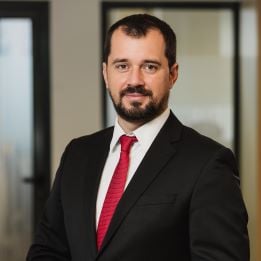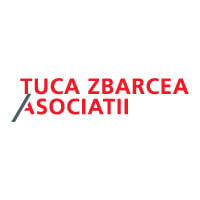

Legal manager, Romania, Moldova, Bulgaria, Serbia, Croatia and Slovenia | STRABAG



Claudiu Țâmpău
Legal manager, Romania, Moldova, Bulgaria, Serbia, Croatia and Slovenia | STRABAG
Team size: 22 between Romania, Moldova, Bulgaria, Serbia, Croatia and Slovenia
Bio
I graduated in 2006 from the Law School of the University of Bucharest, although my work in the legal field started before graduation with various internships in 2004 and 2005. After completing my studies, I joined Platis & Bazilescu, the law firm associated with Ernst & Young, where I worked until 2010. During that time, I gained valuable experience in corporate, real estate, and banking law.
In 2010, I moved to White & Case, which later became Bondoc & Associates in 2014. My focus there was on energy, real estate, mergers and acquisitions (M&A), and regulatory matters, dealing with both national and cross-border issues. This role helped me develop a deeper understanding of the complexities involved in large-scale projects and transactions.
In June 2016, I joined the in-house legal department of STRABAG Group Romania. My work primarily involves construction law and other legal areas relevant to our operations. In parallel, I have taken a keen interest in renewable energy initiatives within our company.
In mid-2017, I began managing the internal legal department, where I’ve had the opportunity to grow our team from two members in 2017 to an inter-disciplinary group of 15 colleagues in 2024, including seven lawyers and six contract managers.
In 2019, I also helped establish the internal legal department for STRABAG Group in Bulgaria. Since early 2023, I have been managing the internal legal departments across several countries, including Romania, Bulgaria, Serbia, Croatia, Slovenia, North Macedonia, Bosnia and Herzegovina, and Montenegro. This role has allowed me to work on various legal matters while supporting our operations across different jurisdictions, aligning our legal strategies with STRABAG’s business objectives while ensuring compliance with local and international regulations.
How do you approach managing legal aspects during periods of instability or crises, and how does your legal strategy align with the broader business strategy to ensure the organisation’s resilience?
Identifying the best suited (from experience and personality perspectives) team members and sourcing them during calm days is key to ensuring that during storms the ship will sail safely to the harbor. Our internal legal department has the added benefit that lawyers work closely with engineers (contract managers) liaising with the sites – which allows us to foresee and as much as possible prevent crises arising from ongoing projects. The legal and contract management department supports the business not only in day-to-day but also in implementation of the various changes required by the group to adapt and transform with the challenges of a construction company in the new sustainability and environment protection focused world.
What measures has your company taken to embed sustainability practices into its core business operations, and how does the role of the general counsel contribute to driving and ensuring sustainable practices within the company?
Strabag is one of the very few construction companies that has endeavoured to transform itself into a technology group. Digitalisation, implementation of AI, robotisation and circular economy are just a few of the transformative actions implemented throughout the various activities carried out in different markets. The internal legal and contract management departments support the operatives on all levels – from assistance in identifying relevant new legislation and adapting to it, to implementation of supervision and reporting mechanisms.
What emerging technologies do you see as having the most significant impact on the legal profession soon, and how do you stay updated on these developments?
AI is the technology to investigate when it comes to impact on the legal profession. As many other lawyers, we are responsibly testing and interacting with several AI products that have been designed to assist lawyers in their work. While it is still generally a developing technology (and even more so on the legal support side), a select group of colleagues is exploring the value that AI tools can bring to our work. Should the use case be confirmed, it cannot be excluded that AI tools will be more generally used.
Legal manager, Romania, Moldova, Bulgaria, Serbia, Croatia and Slovenia | STRABAG